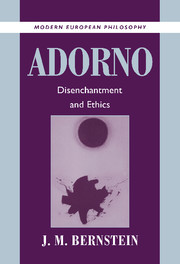Book contents
- Frontmatter
- Contents
- Preface
- List of Abbreviations
- Introduction
- 1 “Wrong Life Cannot Be Lived Rightly”
- 2 Disenchantment: The Skepticism of Enlightened Reason
- 3 The Instrumentality of Moral Reason
- 4 Mastered by Nature: Abstraction, Independence, and the Simple Concept
- 5 Interlude: Three Versions of Modernity
- 6 Disenchanting Identity: The Complex Concept
- 7 Toward an Ethic of Nonidentity
- 8 “After Auschwitz”
- 9 Ethical Modernism
- Index
6 - Disenchanting Identity: The Complex Concept
Published online by Cambridge University Press: 05 June 2012
- Frontmatter
- Contents
- Preface
- List of Abbreviations
- Introduction
- 1 “Wrong Life Cannot Be Lived Rightly”
- 2 Disenchantment: The Skepticism of Enlightened Reason
- 3 The Instrumentality of Moral Reason
- 4 Mastered by Nature: Abstraction, Independence, and the Simple Concept
- 5 Interlude: Three Versions of Modernity
- 6 Disenchanting Identity: The Complex Concept
- 7 Toward an Ethic of Nonidentity
- 8 “After Auschwitz”
- 9 Ethical Modernism
- Index
Summary
The goal of this chapter is to begin providing an account of conceptuality that can answer to the diverse but interconnected set of demands that have arisen in the light of the failures of rationalized reason. Formally, we are seeking a conception of ethical reasoning that will enable reasons for action to be intrinsically motivating. But equally I have contended that reasons for action, ideally, would emerge from cognitive awareness of states of affairs; and in order for that to be the case a state of affairs itself must be capable of lodging a claim. While it is obscure how this might work out in general, in our “fallen state” each particular object we face – each person and thing as set within the institutional frameworks of the modern world – is a rationalized version of itself, hence damaged, hence not as it could be. The desocialization of society that is a consequence of disenchantment makes each object a moral remainder; no particular within rationalized society is, existentially and conceptually, what it could be as a consequence of “our” collective participation in the rationalization of reason and experience. If sensuous particulars are raising claims, then a fortiori there must be a “material” or “sensuous” moment in the concept that rationalization leading to the simple concept suppresses, and, equivalently, something about each object that rationalized concepts have left out of account. Such a conceptual moment, Adorno must presume, when rightly acknowledged, when reintegrated into the concept, would answer to the motivational thesis.
- Type
- Chapter
- Information
- AdornoDisenchantment and Ethics, pp. 263 - 329Publisher: Cambridge University PressPrint publication year: 2001

